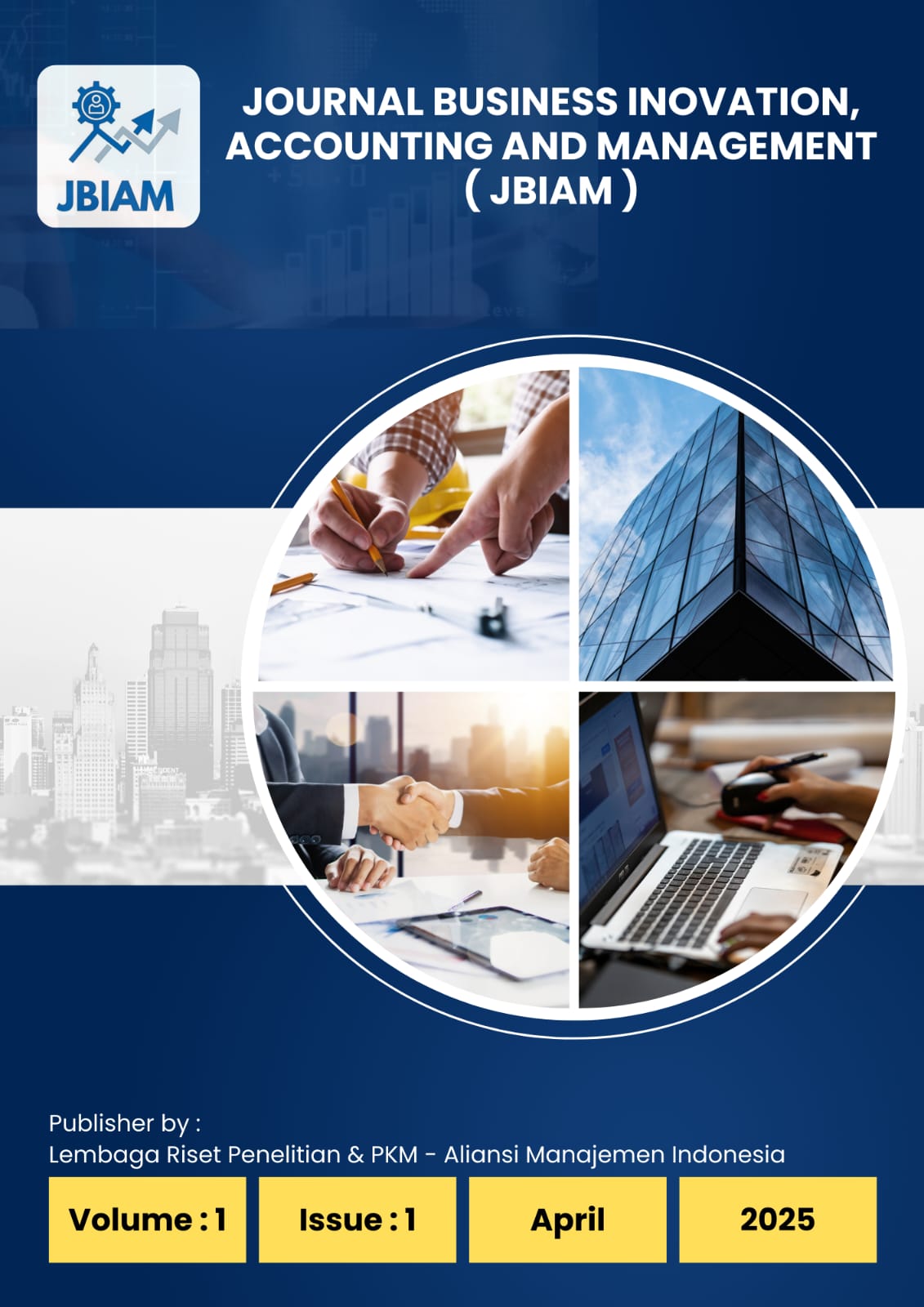The Role of HR Management in Creating an Effective Work Environment at PT Sinar Maju Indonesia
Main Article Content
Abstract
This study aims to analyze the role of human resource management (HR) in creating an effective work environment at PT Sinar Maju Indonesia. The method used is a quantitative approach with data collection through questionnaires that are distributed to 60 employees from various divisions. The aspects examined include recruitment, training and development, reward systems, and internal communication. The results of the study show that HR management has a significant role in forming a conducive work environment. As many as 82% of respondents stated that regular training improves their competence and confidence. In addition, 75% of respondents think that a good internal communication system helps reduce conflict and improve collaboration between teams. Linear regression analysis showed that the HR management variable had a positive effect on the effectiveness of the work environment with a determination coefficient value (R²) of 0.68. These findings confirm that a structured and sustainable HR strategy is essential in creating a productive and harmonious work climate. This study recommends strengthening employee development programs and increasing communication openness between organizational levels.
Downloads
Article Details
Section

This work is licensed under a Creative Commons Attribution 4.0 International License.
References
-, S. K. P., -, D. M., & -, D. R. K. (2023). Strategic Human Resources Management: Study the Alignment of Hr Practices with Overall Business Strategy and Its Impact on Organizational Performance. International Journal For Multidisciplinary Research, 5(5). https://doi.org/10.36948/ijfmr.2023.v05i05.6168
Adha, L. A. (2020). Digitalisasi Industri Dan Pengaruhnya Terhadap Ketenagakerjaan Dan Hubungan Kerja Di Indonesia. Journal Kompilasi Hukum, 5(2), 267–298. https://doi.org/10.29303/jkh.v5i2.49
Edo, E., Handoyo, S., & Sulistyowati, M. E. (2020). Penyusunan Sistem Pengembangan Karyawan Melalui Pelatihan dengan Pendekatan Appreciative Inquiry. INSAN Jurnal Psikologi Dan Kesehatan Mental, 4(2), 102. https://doi.org/10.20473/jpkm.v4i22019.102-110
Gusty, R., Tua R.F.S., H., & Ardianto, A. (2020). Penerapan sitem informasi sumber daya manusia pada program E-Kinerja di Badan Kepegawaian, Pendidikan dan Pelatihan (BKPP) Kabupaten Kuantan Singingi. JAPS: Jurnal Administrasi Politik Dan Sosial, 1(2), 121–140. https://japs.ejournal.unri.ac.id/index.php/JAPS/article/view/26
Hadianto, M. S., & Wahyuningtyas, R. (2025). The Impact of Work Environment , Communication , and Rewards on Employee Performance at The Hajj Financial Management Agency. 6(2), 695–712.
Khaeruman, Mukhlis, A., Bahits, A., & Tabroni. (2023). Jurnal Riset Bisnis dan Manajemen Tirtayasa (JRBMT). Jurnal Riset Bisnis Dan Manajemen Tirtayasa (JRBMT), 7(1), 41–50. https://jurnal.untirta.ac.id/index.php/JRBM
Lingkungan, A., Office, K., Sumber, D. A. N., Nur, A. N., & Widharto, Y. (n.d.). DAYA MANUSIA MENGGUNAKAN METODE ERGONOMI Studi Kasus : PT Pertamina Lubricants Fungsi General Affairs Abstrak.
Manajemen, J., Bisnis, dan, & Hasibuan, R. (2021). Manajemen Sumber Daya Manusia Dan Pengembangan Sumber Daya Manusia: Evolusi Dan Kontribusi. Jurnal Manajemen, Organisasi, Dan Bisnis, 1(3), 481–487. https://www.journal.unrika.ac.id/index.php/JMOB/index
Miharti, I. (2022). Peranan Pelatihan Dan Pengembangan Dalam Kebijakan SDM Bagi Perusahaan. JAMBURA: Jurnal Ilmiah Manajemen Dan Bisnis, 5(1), 36–43. https://doi.org/10.37479/jimb.v5i1.14232
Monalis, E., Rumawas, W., & Tumbel, T. M. (2020). Pengembangan Sumber Daya Manusia dan Kepuasan Kerja terhadap Kinerja Karyawan. Productivity, 1(3), 279–284.
Ong, J. O., & Mahazan, M. (2020). Strategi Pengelolaan SDM dalam Peningkatan Kinerja Perusahaan Berkelanjutan di Era Industri 4.0. Business Economic, Communication, and Social Sciences (BECOSS) Journal, 2(1), 159–168. https://doi.org/10.21512/becossjournal.v2i1.6252
Permadi, I. K. O., & Rasminingsih, N. K. N. (2023). Peran Motivasi Kerja Dalam Memoderasi Hubungan Antara Kepemimpinan Terhadap Semangat Kerja Karyawan. Jurnal Maneksi, 12(4), 738–743. https://doi.org/10.31959/jm.v12i4.1896
Pitoyo, D. J., & Handayani, W. P. P. (2022). Pengaruh Work Life Balance dan Lingkungan Kerja Terhadap Kepuasan Kerja Karyawan. Jurnal Studi Manajemen Dan Bisnis, 9(2), 152–159. https://doi.org/10.21107/jsmb.v9i2.17794
Putro, T. A. D., Yani, L., Aini, B. N., & Qomariyah, Q. (2020). 352 Intuisi 12 (3) (2020). 12(3), 352–364. http://journal.unnes.ac.id/nju/index.php/INTUISI
Sabrina, R. (2021). Manajemen Sumber Daya Manusia: Unggul , Kreatif , dan Inovatif di Era Revolusi Industri 4.0. Jurnal Ilmiah Manajemen Dan Bisnis, 22(2), 216–222. https://doi.org/10.30596/jimb.v22i2.7703
Saimin, Noor Salim, Enny Ariyanto, E. S. I. (2023). Peran Manajemen Sumber Daya Manusia Dalam Meningkatkan Produktivitas Kerja Karyawan Di Era Digitalisasi. Journal of Economics and Business UBS, 12(1), 260–268.
Sarip, S., & Mustangin. (2023). Pengaruh Lingkungan Kerja Terhadap Kinerja Pegawai PT ABC PERSADA. Jurnal Manajemen Diversitas, 3(1), 95–111.
Sewang., Umar, S.M., & dkk. (2024). Manajemen Sumber Daya Manusia ( SDM ) Upaya Peningkatan Kinerja Karyawan Di Era Globalisasi. JUMABI : Jurnal Manajemen, Akuntansi Dan Bisnis, 2(2), 76–86.
Sukmajati, M., & Suharnomo, S. (2022). Pengaruh Kepribadian Proaktif Terhadap Kepuasan Karir Dan Kinerja Karyawan Dengan Kreativitas Karyawan Sebagai Variabel Intervening. Jurnal Studi Manajemen Organisasi, 17(2), 39–48. https://doi.org/10.14710/jsmo.v17i2.39180
Tuwindar, T., & Pendrian, O. (2024). Peran Human Resources Development dalam Meningkatkan Produktivitas Karyawan. Journal of Economics and Business UBS, 13(2), 557–565. https://doi.org/10.52644/joeb.v13i2.1561
Yesica, Y., Sitorus, T., & Purwanto, E. (2020). Pengaruh Tata Kelola Perusahaan yang Baik dan Tanggung Jawab Sosial Perusahaan terhadap Kinerja Keuangan. Journal of Business & Applied Management, 13(2), 191. https://doi.org/10.30813/jbam.v13i2.2356

